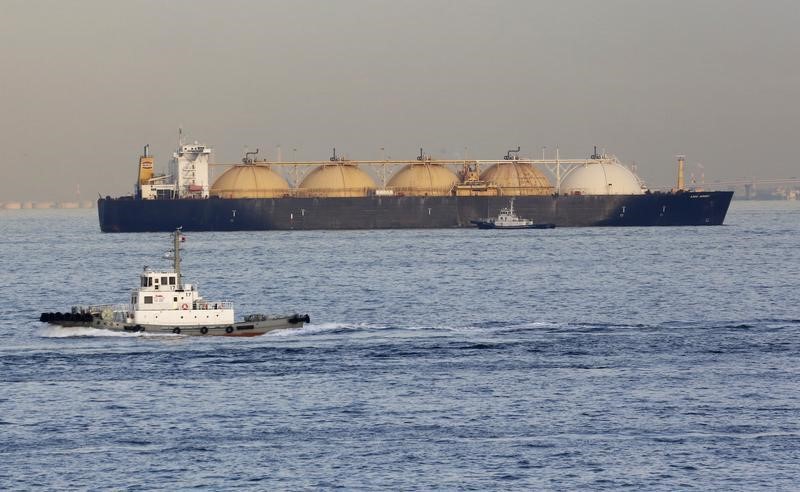(Repeats with no changes to text)
By Clyde Russell
LAUNCESTON, Australia, May 26 (Reuters) - The price of spot cargoes of liquefied natural gas (LNG) in Asia has broken its long-standing link to crude oil this year, a development likely to fuel tensions in an already unsettled market.
Spot LNG LNG-AS was assessed at $4.65 per million British thermal units (mmBtu) in the week to May 20, which is 35 percent down from $6.90 at the end of last year, although slightly higher than the low so far this year of $4, reached in mid-April.
In contrast, global benchmark Brent crude LCOc1 pushed above $50 a barrel on Thursday, up around a third from the start of the year.
Although LNG and crude aren't competing fuels there has traditionally been a strong link between them, given that long-term LNG contracts have been linked to oil prices, and this has in the past strongly influenced spot prices as well.
But the de-coupling of crude and spot LNG prices so far this year is likely to have both negative and positive aspects for the industry, but the overall impact is likely to be heightened uncertainty for participants.
Major LNG producers with long-term contracts tied to the crude price are most likely breathing sighs of relief as Brent breaches $50 a barrel and shows signs of having bottomed earlier this year.
But given the ongoing weakness in spot LNG, buyers are likely to seek to maximise purchases of spot cargoes and try and vary the amount they take on long-term contracts.
Put another way, LNG buyers are likely to be annoyed at having to pay higher, oil-linked prices for long-term supplies when they can see considerably cheaper cargoes available on a spot basis.
This dichotomy is likely to up buyer pressure on producers to amend or renegotiate long-term contracts to make them reflect the realities of the natural gas and LNG markets, rather than the oil market.
However, producers will have little incentive to end oil-linked contracts, as this would cut their revenues substantially and expose them further to the glut of LNG that is expected to persist for several years to come.
The oversupply of LNG may actually worsen in coming years as more U.S. projects ramp up and the last of the eight major Australian ventures come to full production.
This means buyers increasingly hold the upper hand, making it more likely that producers will have to accept lower prices in order to grow demand.
DEMAND GROWTH INSUFFICIENT
Demand is emerging as an issue for LNG, with top buyers such as Japan and South Korea experiencing declining demand, with increased purchases by China and India compensating, but not quickly enough to offset rising supply.
Japan, the No.1 LNG buyer, is a market most likely in structural decline for LNG, with imports falling 3.3 percent in April from a year earlier to 6.38 million tonnes, taking the drop for the first four months of the year to 5.5 percent.
Imports may fall again in May, with vessel-tracking data compiled by Thomson Reuters Commodity Research and Forecasts showing 5.3 million tonnes are scheduled for discharge at Japanese ports this month.
South Korea's imports also dropped in April, falling 22.8 percent from the same month in 2015 to 2.18 million tonnes, bringing the year-to-date fall to 8.4 percent.
Ship-tracking data suggests that May imports should be largely steady from April's level, with 2.3 million tonnes scheduled for off-loading.
China, the great hope for LNG demand in coming years, saw its imports jump 22.4 percent in April from a year earlier to 1.886 million tonnes, bring the gain for the first four months of the year to 18.6 percent.
May imports are likely to be around the same level as April's, with vessel-tracking data foreshadowing 1.9 million tonnes to be discharged.
India's imports are also likely to be largely steady in May, matching April's 1.6 million tonnes, leaving the South Asian nation with fairly strong year-on-year growth of about 17 percent, according to a report by consultants Energy Aspects.
LNG imports by Japan, South Korea, China and India, the top four Asian buyers, are likely to reach 65.3 million tonnes in the first five months of 2016, according to vessel-tracking data.
This is 6-percent higher than for the same period last year, but the extra 3.7 million tonnes of demand pales in comparison to the capacity additions in the region, with Australia alone adding 40.9 million tonnes to the market in 2015 and so far this year.
Rising LNG supply will weigh on spot LNG prices, potentially widening the discount to long-term, oil-linked contract LNG, a situation guaranteed to stoke tensions between producers and buyers.
<^^^^^^^^^^^^^^^^^^^^^^^^^^^^^^^^^^^^^^^^^^^^^^^^^^^^^^^^^^^ GRAPHIC on Asia spot LNG vs Brent crude oil
http://tmsnrt.rs/1TL2MpN
^^^^^^^^^^^^^^^^^^^^^^^^^^^^^^^^^^^^^^^^^^^^^^^^^^^^^^^^^^^> (Editing by Joseph Radford)
